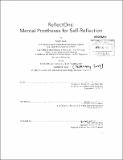ReflectOns : mental prostheses for self-reflection
Author(s)
Sadi, Sajid H. (Sajid Hassan)
DownloadFull printable version (35.67Mb)
Other Contributors
Massachusetts Institute of Technology. Department of Architecture. Program in Media Arts and Sciences.
Advisor
Patrcia Maes.
Terms of use
Metadata
Show full item recordAbstract
Since the time of the first philosophers, logic and observed human behavior have stood somewhat in contradiction. More recently, scientist have started to delve into decision making to understand why the way we act differs from rational choice, and indeed from our own desires. We believe that it is possible to use just-in-time feedback drawn from machine-observable behavior to help align behavior with personal goals. This dissertation presents mental prosthetics, a model for distributed, embodied, design-embedded, just-in-time interfaces that augment the human judgment process. Drawing information from the activity of the user around them, mental prostheses analyze behavioral patterns in a way orthogonal to human cognition. Unlike persuasive interfaces, mental prostheses attempt to align choices with personal goals by cueing the user with just-in-time information. Lastly, these devices provide calm yet understandable feedback to draw the user's attention at the correct time to the information available to them. This dissertation provides several prototypes and design explorations as a means of sampling the various approaches to data collection, synthesis, and feedback. Focusing on self-reflection, these sample designs form a subclass of mental prostheses that we term reflectOns. We show through the studies carried out in the course of this dissertation that these systems are effective in changing behavior to be better aligned with user goals. Lastly, this dissertation provides a set of design guidelines that assist in the creation of new mental prostheses. While we discuss a variety of scenarios in this work, it is only the beginning of the exploration. The design guidelines provide insight into both the critical aspects of the design of such systems, as well as possible input and feedback methodologies. These guidelines, together with the reflectOns themselves, provide a basis for future work in this area.
Description
Thesis (Ph. D.)--Massachusetts Institute of Technology, School of Architecture and Planning, Program in Media Arts and Sciences, February 2013. "September 2012." Cataloged from PDF version of thesis. Includes bibliographical references (p. 113-118).
Date issued
2013Department
Program in Media Arts and Sciences (Massachusetts Institute of Technology)Publisher
Massachusetts Institute of Technology
Keywords
Architecture. Program in Media Arts and Sciences.